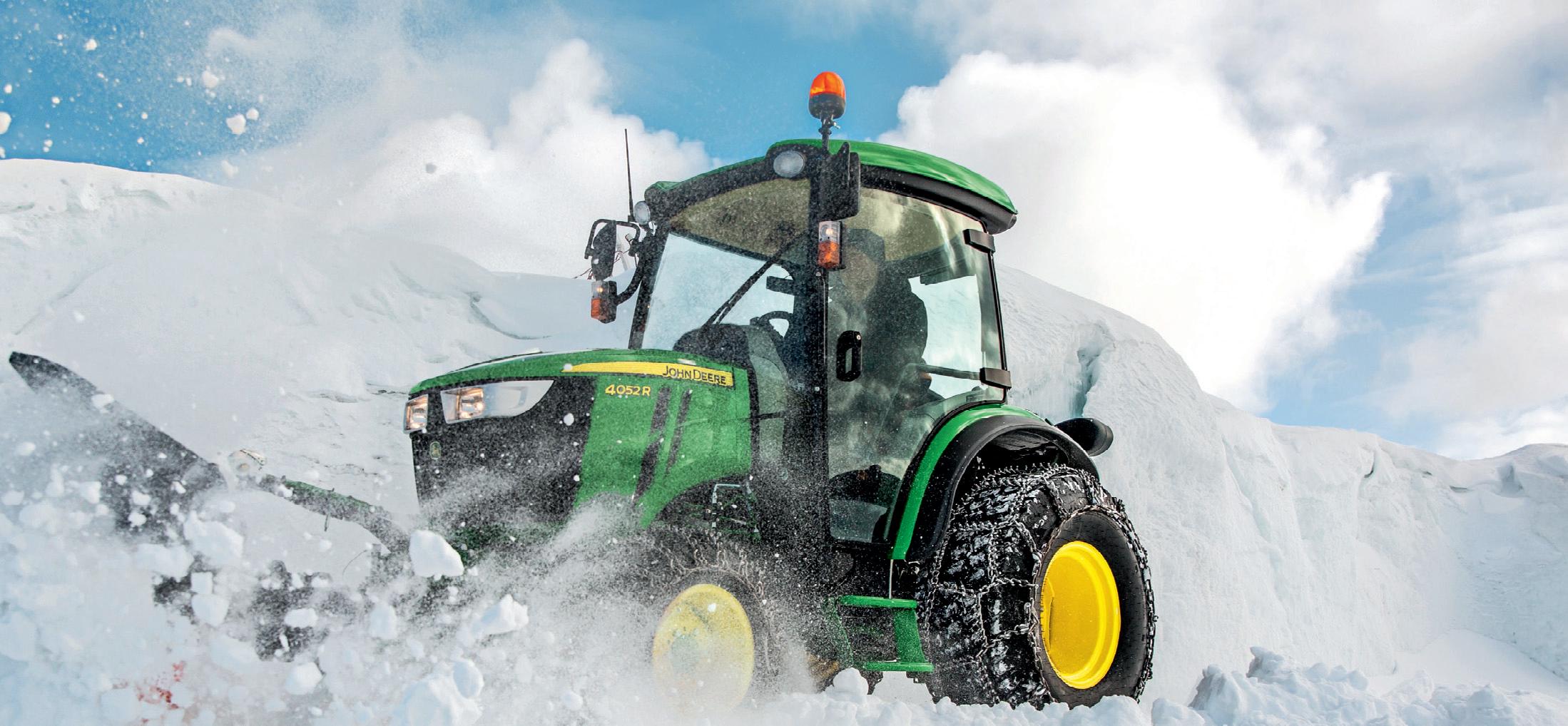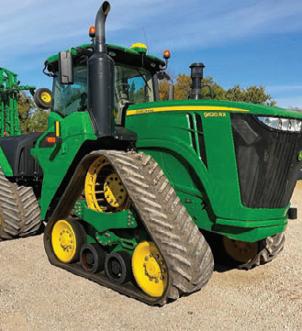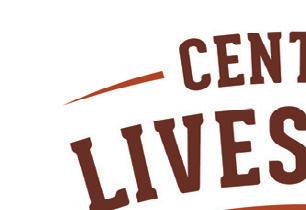is for Yak









































 BY SARAH COLBURN | STAFF WRITER
BY SARAH COLBURN | STAFF WRITER



WELCH – Yaks graze the pasture of Melodee Smith’s farm, their thickened winter coats of dense luxurious down providing all they need for the harsh Minnesota winters.
There is a sense of calm in the pasture, a serenity comes from the spirit of the animals. Smith works toward that calm intentionally, bottle raising her yak calves, giving the exotic, wild animals what she said is a tamer demeanor. There’s no bellowing in the pasture, just an occasional low grunt as the yaks communicate with each other.
“This is the result of bottle raising. I wanted a herd where I can go out in the pasture and enjoy being with


the animals and not be intimidated or threatened by their presence,” she said.





“Mingling with the yaks is quite therapeutic because they are so docile. It’s calming.”





Smith runs Clear Spring Farm, specializing in Royal and Native Trim Tibetan yak. She sells bottle babies, starter herds, rare yak fiber products, yak meat and a variety of agritourism activities.

Smith knows each of her 45-member herd by name and can identify each of her animals, even from the rear or side as she approaches. She knows which yaks are bonded and finds them frequently together. She knows six-year-old Emil is deaf and that she needs to keep a hand on him at all times when working with him. She knows which ones love to cud-
dle, which want to lick her legs and hands, which are playful and will approach running with their tails flying over their backs and which ones would rather acknowledge her from a distance.


gs which and ch runtheir over ld
Smith welcomes Tibetan refugees, and all visitors, to her farm regularly. She has a special relationship with the people of Tibet who have a true and honest respect for the yak. Many, she said, haven’t seen a yak in decades and are grateful to reconnect with an animal who is revered in their home country.
“I can feel their connection to the yaks,” she said.
“I love to share my farm and my animals
with people who are interested in, and love them.”
Often, she said, her Tibetan visitors will hug the yaks, sprinkle them with Holy Water and bring a picnic lunch and relax on the grounds in the presence of the 600 to 800-pound animals. They’ll pick up dried dung to use as firewood, just as they did in Tibet. In Tibet, she said, people often milked yaks – something she doesn’t do because it’s so tedious and only produces six cups per milking.
at Clear Spring Farm. The Smith’s raise a herd of yaks on their small farm near Welch.

(Left) Melodee Smith’s niece, Olive Anderson, gets up close with Faith, one of the yaks on Clear Spring Farm near Welch. Clear Spring Farm is home to 45 yaks.




Though many Tibetans are vegetarians, she said they use every single part of a yak when it dies of natural causes – the bones for jewelry, the fiber for clothing, the meat for food.
Kalsang Kyoh brought her parents to the farm to see the yaks. She learned about Smith’s farm when Smith brought some animals to the celebration of His Holiness Dalai Lama’s birthday.









































“They’re like air plants around here,” she said. “They are wonderful.”
Smith currently sells her yak meat direct to consumers but also to coops in Rochester, Northfield and Minneapolis. She also sells to the Bleu Dog Café in Welch Village as well as Everest on Grand in St. Paul, which make yak burgers and yak momo respectively.


Yak meat, she said, is very lean at 98 percent fat free and is a protein coveted by the health conscious.
“Yak meat is unique,” she said. “I’ve found people are willing to pay the extra money for these high-quality products.”
She describes the flavor as light and said it’s similar to bison. She stopped selling the steaks of the animal because Minnesotans, she said, tend to overcook them and they dry out. Instead, she specializes in roasts, ground meat, hot dogs, yak sticks and jerky. All of her meat is processed at USDA facilities in Wisconsin.
Clear Spring Farm was home to Jericho, a 20-year-old Native Trim Tibetan Yak who held the title of Longest Yak Horns in the World until his passing in 2019. His horns measured 126 inches long from tip to tip and 10 inches in circumference.
Due to their size and strength, Smith certainly doesn’t recommend people randomly go out and find any yak to hug. Her herd, she said, is one she knows well and understands.
“I can stand next to the animal and have my hands in that thick, soft
fiber and just pet them,” she said. “It would be similar to the reason we have dogs. You can go out there and talk to them and they have an unconditional love.”
She brushes out her yaks with a dog brush each spring, collecting the fibers. Over the course of six weeks, she gets about one pound of fiber per animal, per year. She welcomes others to the farm to help during brushing season, and volunteers come to gather around the animals for fun. She collects about 30 pounds of fiber a season and sends it a mill in Connecticut for dehairing and processing, a costly endeavor. Ultimately, she said, the yarn commands about $50 per skein.

“It’s an exotic fiber that has no lanolin in it. It’s considered hypo-allergenic. It has moisture-wicking
ability to it,” she said.
While Smith provides tours and on-farm events including specialty dinners, and even fosters out some of her baby yaks to area families to bottle feed, the thing that has surprised her most through the years is the number of people interested in starter herds.





“It’s more than I can supply, especially when people want tame ones,” she said.
She said she can see a future where the demand for yaks explodes as people realize the benefits of farming them. She said the only thing that could be a deterrent is the intimidation factor of their impressive horns and the availability of yaks.
“In the 80s and 90s alpaca exploded,” she said. “I have a feeling yaks could follow suit.”
PTO, 6 hyds., Powershift Transmission, 6,293 hours, JD Active Seat, HID Lights; 2008 John Deere 7330 MFD w/John Deere 741 Loader, Power Quad Trans, 460/80R48’’ Tires, 380/80R28’’ Tires, 3 hyds., Joystick Controls, 3,549 hrs; 1967 John Deere 4020, Diesel, 3pt, PTO, 18.4x 34’’ tires, 1 hyd.; 1966 John Deere 4020, Diesel, 2 hyds., 3pt, PTO; 1962 John Deere 3010 Tractor, Gas, 1 hyd., 15.5x38’’ Tires


2017 John Deere S680 Combine, 650/85R38’’ Tires and Duals, 750/65R26’’ Rear Tires, Crary Hopper Extension, Power Cast Tail Board with SI Rear Power Fan, 1797 Engine hours, 1468 Sep hours, Premium Cab, LED Lights, GS3 2630, Armrest, 26ft auger, Dual Tilt Fore & Aft Feeder House;


LAKE CITY – The Ficks have overcome many obstacles together, yet their dedication and determination to their family, community, and dairy farm has remained unchanged.


The Fick’s are actively involved in 4-H, Wabasha County Cattlemen’s Association, snowmobile club, and many sports. The six-person family operates a 230-cow dairy and they keep busy year-round. They also find time to bring their 15-yearold daughter, Abby, to doctor appointments.
In October


2021, Abby was diagnosed with Malignant Peripheral Nerve Sheath tumor cancer. She lost her left arm as a result, but doesn’t let that slow her down as she still assists with farm chores.


Tara and Troy run and operate T-N-T Dairy, along with their four children, Abby, 20-year-old Mallory, 17-yearold Rylee and 13-year-old Nolan. Between the four kids, the Ficks keep busy traveling to various sports
to various sports including football, basketball, volleyball, softball,
and trap shooting. “Having the kids in sports is a great way for them to keep connected with their friends,” Tara said.
Running their family farm and being active members of the community have earned the Fick family the title of Wabasha County Farm Family of the Year.



The Ficks milk their cows, raise their own heifers, grow their own crops, and maintain the dairy. The members of the family complete all the necessary chores, with the exception of one-hired hand who does the milking. They mainly have Holsteins, with a few Brown Swiss for showing.
Their oldest daughter Mallory lives off the farm, but likes to be on the farm and helps as often as she can.
The Ficks enjoy work-

ing together as a family, and all have their specialty chores. Troy mixes the feed and feeds the cows and heifers, Tara feeds the calves, and the kids help with miscellaneous chores like hauling manure, bedding pens, field work, driving silage trucks or driving the packer.
PHOTOS SUBMITTED Rylee (from left), Tara, Mallory, Nolan, Troy and Abby Fick gather together after receiving their award in August. The Fick family owns and operates T-N-T Dairy near Lake City, where they milk 230 dairy cows.
Troy’s parents, Marvin and Ruth, began the farm in 1972. They lived down the road, but had always milked, and when the homestead came up for sale, they purchased it. Growing up, Troy was the only boy, but had three sisters. He enjoyed milking cows, and knew what he wanted to do when he came home from college. He graduated from college in 1992, and began to take over the farm.
When Troy married Tara in 2004, she quickly adapted
to the farm wife and mother role.
“I enjoy doing the farm chores and mom duties,” Tara said. “I really enjoy cooking, baking and canning.”
Troy’s parents still live on the farm with Troy and Tara and they like to help out with their grandkids from time to time, and handle other small maintenance occurrences.




































from page 4
Keeping active in various clubs and organizations have helped keep the Ficks in tune with the community. The kids are active within 4-H. Rylee enjoys showing pigs, Abby enjoys showing both dairy and pigs and Nolan enjoys autocross.






As a family, the Ficks also share a love of snowmobiling. They are members of the snowmobiling club and like to go on trips, and find a good change of pace when they are able to leave the farm to pursue this hobby.


“It’s fun to go out, the kids enjoy it,” Tara said. “It’s also good family time.”



The kids also know their chores and work have to get done before their fun activities. Troy and Tara like
raising their kids on the farm, and are happy to have them involved in other organizations.
“It’s a great way to raise a family and kids,” Tara said.

Troy agreed.
“We enjoy socializing and getting off the farm for a while.”
Tara also used to work off the farm in the Lake City school district, for seven years until Covid hit in 2020. She liked to work off the farm, but said she also liked to come home and work with her family and the animals.
“It’s hard work, but you can set your own
hours,” Tara said. “We love working with the animals and being outside.”

Throughout the years, the Ficks have made many updates to the farm.
“We’ve come a long way with updating buildings and equipment,” Tara said.






























































































































































































































































 BY TAYLOR JERDE | STAFF WRITER
BY TAYLOR JERDE | STAFF WRITER
HOUSTON – Buffalo Gal takes orders for meat from all across the United States. The company has customers from the East Coast, the West Coast and even Alaska and Hawaii. They’re all in search of the unique products Buffalo Gal has to offer.



The Minnesota business offers fresh meat cuts from bison, wild boar, elk, Scottish Highlanders and yaks. They utilize every part of the buffalo to make soap, lotion and tallow candles to sell as well.

“We really like working with the animals, and making a quality product that makes people happy,” Nicole said.



The business is run by siblings, Derek and Nicole Fogel. Derek’s daughter Naomi works closely




with them, learning how to run things for the future.

The siblings mother Imajene is also involved in the company. The farm and the business began with her husband Mike, who passed away in 2021.
Beyond the success of its meat business, Buffa-
lo Gal is well-known for something else too – their buffalo who’ve appeared on television and in movies.

They had an orphan bottle calf named Cody who appeared in “Dances with Wolves,” Subway commercials and walked in parades.
“He really opened a lot of doors for my family,” said Derek Fogel, owner and manager.
When Cody died in 2006, the Fogel’s knew they needed another animal to serve as the face of the species. In came Cody 2. Cody 2 was born the same year Cody died and now, at the age of 16, he’s been in a number of commercials including those for Taco John’s as well as some parades and photo shoots.

He’s docile and easy to handle, Derek said.
Outside of the commercial work, which they said is fun to have, they work to raise the buffalo naturally on their Money Creek Buffalo Ranch farm, and leave them alone.
4:00 pm Baby calves, arena 2 TUESDAY
“We let them do their thing,” Derek said. Their family has been raising and selling fresh products from various animals for nearly 47 years. They sell their products online and in their on-site store.

The family members said they enjoy working with one another, working with the animals, and they like the freedom that comes with running a family business. They also enjoy making a quality












product that makes consumers happy.
Throughout the years, the Fogel family has raised other various species of animals. They’ve had camels, elk, bears, wallabies and kangaroos.






“It’s always been a life style,” Derek said.
In 1976, Mike Fogel began his family’s business journey. At the age of 25, he quit his job in a factory and bought some buffalo. He always had an interest in the unique animal and the native culture. During his time on a Montana ranch in 1982, prior to starting the Minnesota farm, he decided to take two buffalo to the National Western Stock Show. When each buffalo brought home a trophy, it solidified the family’s future and those trophies still sit in the Buffalo Gal gift shop today. When Mike first began Buffalo Gal, he started it as a live animal business, and didn’t begin in the meat industry until the 80’s. In the beginning, Derek said, buffalo was a novelty, but soon grew in popularity. Mike began with jerky and other processed meats, but quickly realized he wanted to offer a fresher product. He transitioned to selling fresh cuts in the early 90’s, and at that same time also transitioned to selling directly to the consumer.








The company’s mission of “bringing you nature’s healthiest meat products” was born. Nicole said it is at the root of what they do today.
“We like offering a high-quality product, that’s affordable, and that people enjoy,” Nicole said.
The Fogel’s said they have received a lot of positive feedback from their customers through the years and Naomi said they like to keep their customers happy.
“We keep it consistent,” Naomi said.




Their family has strong relationships with their four different processors located in Wisconsin, Minnesota and South Dakota. Each one, they said, has their specialty.
































The company was actually founded originally in Wisconsin but moved to Montana when Mike got a business partner with a ranch. On this ranch in Montana, they could raise 600 buffalo. When his business partner passed away in 1987, Mike moved back to the Midwest to Minnesota where they currently are located. He liked his current location because of how close it was to his original home.
No matter where the business has been, the focus has been on raising quality animals. The Fogel’s ensure the buffalos receive enough mineral and feed. They are hardy animals, but should still be watched and managed like any herd of livestock. They feed pumpkins to the buffalo, because it acts as a natural wormer.

Today, they currently raise around 75 buffalo. The most they have had on their homestead in Minnesota, has been nearly 300 buffalo.



To keep up with customer demand, Buffalo Gal has two to three animals processed a week and they fill roughly 50 to 60 orders from those animals.
Christmas, they said, is even busier. The ongoing customer favorite is their ground bison; however, they also have some seasonal favorites. In the summer, brats seem to be a favorite, and during the holiday season, customers like summer
sausage.
They offer gift boxes for the holidays.
“There’s an opportunity to give a unique gift,” Derek said.
For their online store, and inside their on-site shop, they offer other locally made products as well as organic vegetables from Sno Pac in Caledonia and cheese from a local cheese-maker in Wisconsin.
Although the Fogel family is not looking to expand in the future, they plan to maintain and keep a good business running. They love the animals they work with, and are proud to continue staying in business. Imajene is happy the business that started with her husband’s passion is continuing into what will soon be the third generation.
“If you really love your job, then you’ve never worked a day in your life.” Imajene said.
e s r he king ture, ina what e lylove
